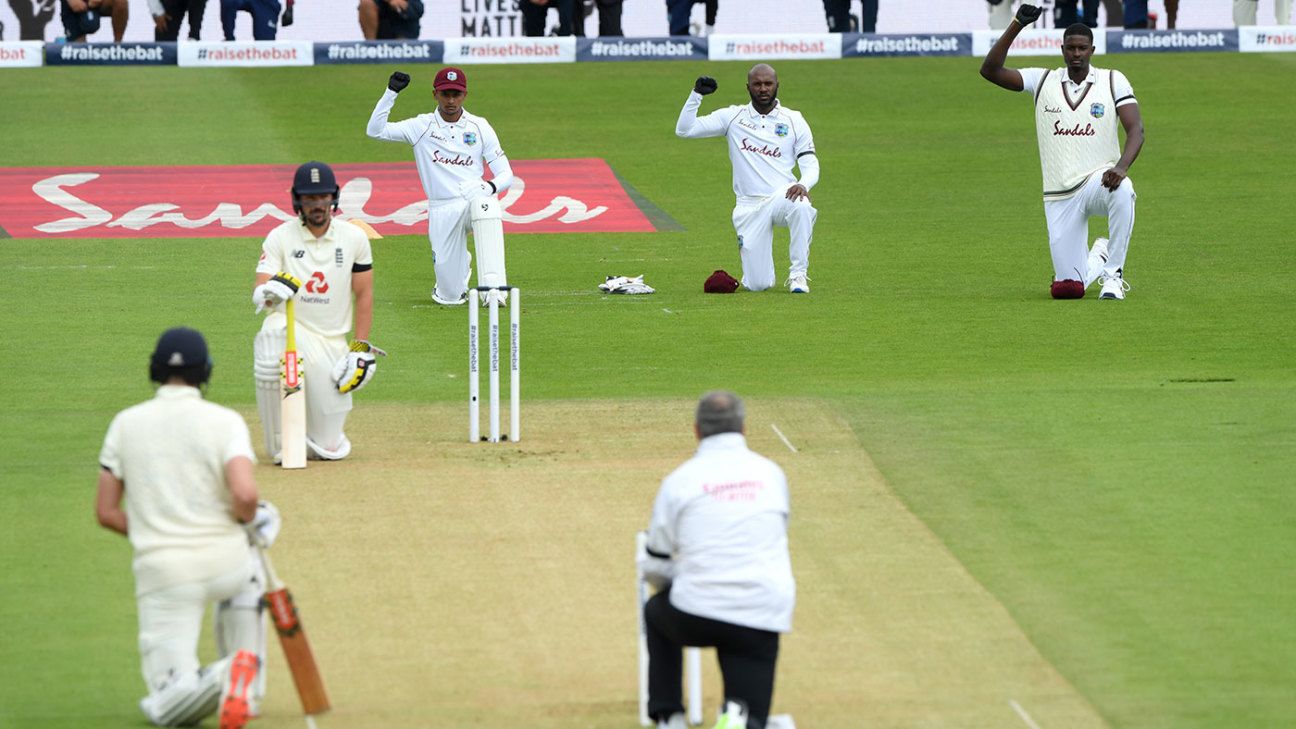Players from both teams and match officials have taken part in a poignant gesture in support of the Black Lives Matter movement before play in the first Test between England and West Indies at the Ageas bowl.
The players, support staff and umpires all took a knee, with each member of the West Indies team wearing a black glove on his right hand, which they raised in a fist while kneeling.
After rain delayed the start of play in Southampton by three hours until 2pm, both teams stood in a semi-circle around the pitch to observe a minute’s silence for those who have lost their lives in the Covid-19 pandemic and for Sir Everton Weekes, who died on July 1 aged 95.
Immediately afterwards, the players – along with umpires Richard Kettleborough and Richard Illingworth – took up their positions and all dropped to one knee, with the fielding West Indies players raising their gloved hand. England batsmen Rory Burns and Dom Sibley knelt at the crease as the rest of the England players and support staff were kneeling down on the boundary in a powerful showing of solidarity.
Both teams had spoken about their intention to make a gesture in support of the Black Lives Matter movement following the death of George Floyd on May 25 in Minneapolis, in the United States, which sparked a series of demonstrations around the world. Floyd, a 46-year-old black, died after a white police officer, Derek Chauvin, restrained Floyd by pressing down on his neck with a knee for nearly nine minutes while he was handcuffed.
Many protesters have “taken a knee” referencing Colin Kaepernick, the former National Football League (NFL) quarterback, who famously knelt during a rendition of the US national anthem at an NFL game while representing San Francisco 49ers to protest police brutality and racial injustice in 2016.
ALSO READ: Brathwaite hopes BLM changes perceptions in sport
In the lead-up to this Test – the first international cricket be played for nearly four months in the aftermath of the Covid-19 pandemic – the England and West Indies teams announced they would wear a Black Lives Matter logos on their playing shirts and suggested they would do something more to mark the movement before the start of play.
Ben Stokes, standing in as England captain for the first Test while Joe Root is on paternity leave, said on the eve of the match: “There is going to be a gesture shown from us as a team in support of Black Lives Matter towards the equality in society throughout cricket and throughout sport. We aren’t in any way, shape or form showing support towards any political matters on the movement. We are all about the equality through society and sport.”
In June, the ICC said it would take a “common sense” approach to players “using their platform to appropriately express their support for a more equitable society” with such expressisons to be “assessed on a case-by-case basis by the match officials”. In the past, the ICC has acted when players have made statements that could be considered political.
The worldwide protests have sparked discussion on systemic racism within sport, including cricket. Michael Carberry, the former England batsman, claiming “cricket is rife with racism”.
Daren Sammy has also spoken out, revealing he was given a racist nickname while playing in the IPL. Carlos Brathwaite, who is covering the England-West Indies Test series for the BBC, said: “Hopefully with the Black Lives Matter movement and the awareness of the racial bias that’s happening in the world today.”
Wednesday’s gesture followed a powerful segment on Sky Sports’ match coverage in which broadcasters Michael Holding and Ebony Rainford-Brent gave impassioned accounts of their own experiences of racism within the game.
Last month, both had spoken ESPNcricinfo for a feature on the experiences of black players in English cricket.
In that article, Holding said: “There is no single person responsible for systemic racism and that’s why people have to come together to beat it. And you have to change it from the grassroots, systematically. The burden of change, though, shouldn’t be on the kids. It’s the adults who need to change. The white people who don’t speak up are part of the problem. It should be clear by now that silence isn’t going to solve it. It’s 2020: if we don’t change now, then when?”
